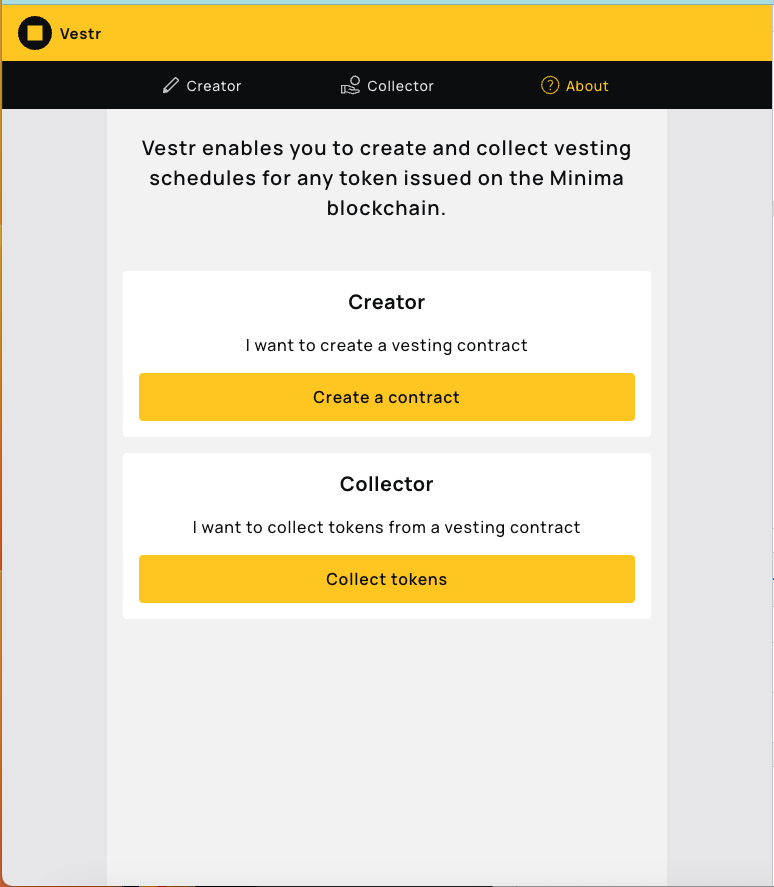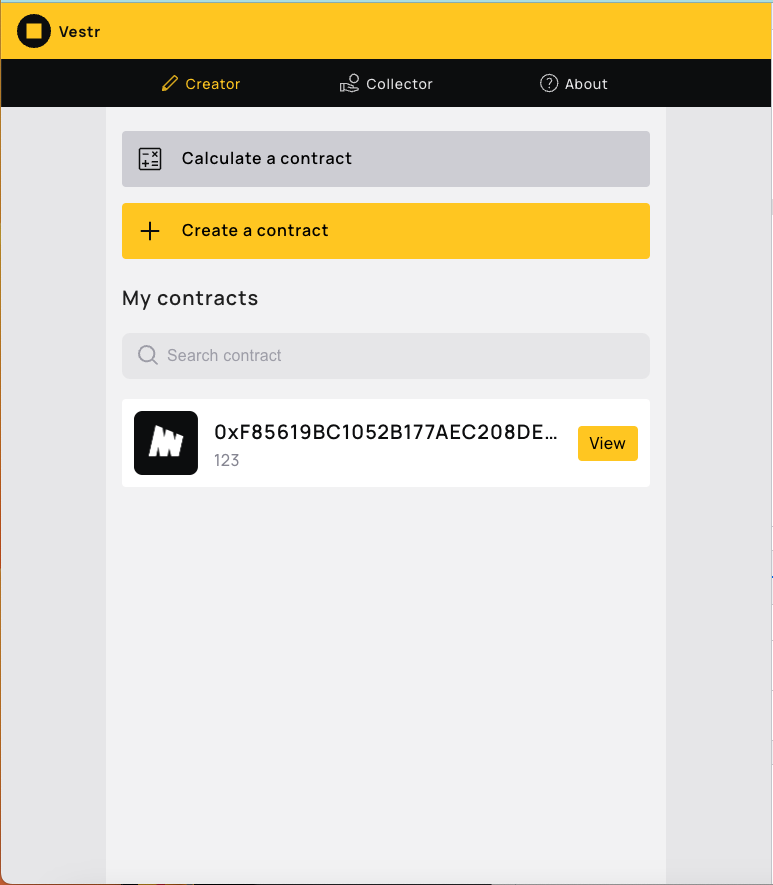Create a vesting contract, track your contracts, withdraw when available.
This is for users who have issues collecting on the Vestr App for any unique reasons. This is a guide on how to collect the contract, explaining the steps thoroughly.
To begin, Vestr contracts consist of these state variables:
| State Variable | Description |
|---|---|
| 0 | Collector’s address |
| 1 | Locking up amount |
| 2 | Start contract block height |
| 3 | End contract block height |
| 4 | Minimum time user must wait between collections (Blocks) |
| 5 | Current time (unix) |
| 6 | Starting block (unix) |
| 7 | Grace period (unix) (This is state variable 4 but in unix) |
| 8 | End block (unix) |
| 199 | Unique Identifier for Contract |
If you need more explanation on how the contract works, check the 2 sections below this one.
// create a new txn
txncreate id:customVestr
txninput id:customVestr coinid:collectingCoinid scriptmmr:true
txnoutput id:customVestr address:withrawalAddress amount:canCollectAmount tokenid:tokenId storestate:false
// if there is any amount left in the contract after add the change
txnoutput id:customVestr address:scriptAddress amount:change tokenid:tokenId storestate:true
// Add all the state variables, you can use the util fnc getStateVariable to help here
// if you are doing it by code, otherwise just add each state variable
txnstate id:customVestr port:0 value:${MDS.util.getStateVariable(
coin,
0
)};
txnstate id:customVestr port:1 value:${MDS.util.getStateVariable(
coin,
1
)};
txnstate id:customVestr port:2 value:${MDS.util.getStateVariable(
coin,
2
)};
txnstate id:customVestr port:3 value:${MDS.util.getStateVariable(
coin,
3
)};
txnstate id:customVestr port:4 value:${MDS.util.getStateVariable(
coin,
4
)};
txnstate id:customVestr port:5 value:${MDS.util.getStateVariable(
coin,
5
)};
txnstate id:customVestr port:6 value:${MDS.util.getStateVariable(
coin,
6
)};
txnstate id:customVestr port:7 value:${MDS.util.getStateVariable(
coin,
7
)};
txnstate id:customVestr port:8 value:${MDS.util.getStateVariable(
coin,
8
)};
txnstate id:customVestr port:199 value:${MDS.util.getStateVariable(
coin,
199
)};
txnpost id:${id};
txndelete id:${id}
LET unlockaddress = PREVSTATE(0) // withdrawing address of contract
LET totallockedamount = PREVSTATE(1) // the original total amount locked
LET startblock = PREVSTATE(2) // the starting block of the contract
LET finalblock = PREVSTATE(3) // the final block of the contract
LET minblockwait = PREVSTATE(4) // the minimum block time we must wait between each collection
ASSERT SAMESTATE(0 8) // Ensure that all state variables are the same transaction to transaction
ASSERT PREVSTATE(199) EQ STATE(199) // Make sure that state variables 199 -> 199 are the same
// If current block time greater than the final then allow collection for all
IF @BLOCK GTE finalblock THEN
IF VERIFYOUT (@INPUT unlockaddress @AMOUNT @TOKENID false) THEN RETURN TRUE ENDIF
ENDIF
// If current block less than the starting block then reject execution
IF @BLOCK LT startblock THEN RETURN FALSE ENDIF
// If the coin's age is less than the minimum block time wait then reject execution
IF @COINAGE LT minblockwait THEN RETURN FALSE ENDIF
// calculate the total duration of the contract
LET totalduration = finalblock - startblock
// If the total duration is less than zero then that means the contract has finished
// now allow them to collect the full amount
IF totalduration LTE 0 THEN
LET blockamount = @AMOUNT
ELSE
// otherwise make it so they can collect a partial according to the duration
LET blockamount = SIGDIG(2 (totallockedamount / totalduration))
ENDIF
// We use SIGDIG(2 (amount)) which returns us the amount to 2 significant digits
// this will evade mis-calculations and ignores the less significant digits
// in the total amount they can collect
// this is done because sometimes as they are constructing the contract
// the block time recorded in this contract vs real time changes
// and so this will error the contract
// Let's calculate how much they can collect on this block
LET owedamounttime = @BLOCK - startblock
LET owedamountminima = owedamounttime * blockamount
LET alreadycollected = totallockedamount - @AMOUNT
LET cancollect = SIGDIG(2 (owedamountminima - alreadycollected))
// If the cancollect amount is less than 0 then reject
IF cancollect LTE 0 THEN RETURN FALSE ENDIF
// If the cancollect is greater than the coin amount then let them collect all
IF cancollect GT @AMOUNT THEN LET cancollect = @AMOUNT ENDIF
// Let's verify all the outputs are valid
LET payout = GETOUTAMT(@INPUT)
IF GETOUTADDR(@INPUT) NEQ unlockaddress THEN RETURN FALSE ENDIF
IF GETOUTTOK(@INPUT) NEQ @TOKENID THEN RETURN FALSE ENDIF
IF payout GT cancollect THEN RETURN FALSE ENDIF
IF GETOUTKEEPSTATE(@INPUT) NEQ FALSE THEN RETURN FALSE ENDIF
LET change = @AMOUNT - payout
// If there is no change then ignore check
IF change LTE 0 THEN RETURN TRUE ENDIF
// Now verify that the opposing output is true
RETURN VERIFYOUT(@INPUT+1 @ADDRESS change @TOKENID TRUE)
The Smart Contract’s Maths calculation is as follows:
// This is a smart contract script written just to use the
// checkMaths Minima command to do the calculation for us using KISSVM Math
// This will ensure precision
LET totallockedamount=PREVSTATE(1)
LET startblock=PREVSTATE(2)
LET finalblock=PREVSTATE(3)
LET minblockwait=PREVSTATE(4)
LET mustwaitblocks="0"
LET mustwait= (@BLOCK - @COINAGE) GT "0" AND minblockwait GT (@BLOCK - @COINAGE)
LET contractexpired = @BLOCK GTE finalblock
IF mustwait EQ TRUE THEN LET mustwaitblocks=minblockwait - (@BLOCK - @COINAGE) ENDIF
LET coinsage=@COINAGE
LET cliffed=@BLOCK LT startblock
LET totalduration=finalblock-startblock
IF totalduration LTE 0 THEN LET blockamount=@AMOUNT ELSE LET blockamount=SIGDIG(2 (totallockedamount/totalduration)) ENDIF
LET owedamounttime=@BLOCK-startblock
LET owedamountminima=owedamounttime*blockamount
LET alreadycollected=totallockedamount-@AMOUNT
LET cancollect=SIGDIG(2 (owedamountminima - alreadycollected))
IF cancollect GT @AMOUNT THEN LET cancollect=@AMOUNT ENDIF
LET change=@AMOUNT-cancollect LET totalsum = change + cancollect LET totalinput = @AMOUNT
IF contractexpired EQ TRUE THEN LET mustwait=FALSE ENDIF
IF contractexpired EQ TRUE THEN LET cancollect=@AMOUNT ENDIF
We then use the runscript method to calculate this for us, this only runs the calculation
// you add the script we mentioned above, the previous state variables as if it was the actual coin, and we add the globals that the contract requires, e.g @BLOCK
// This contract requires globals: @AMOUNT, @BLOCK, @COINAGE
runscript script:"theAboveScript" prevstate:addAllPreviousState globals:addAllGlobals

